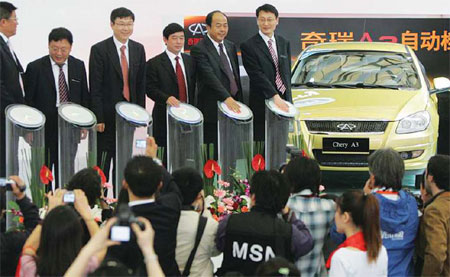Chery plans public listing to fuel expansion plans
China's emerging carmaker Chery Automobile Co is moving closer to a domestic listing to fuel its rapid expansion, according to a top executive from the company.

Top executives of Chery Automobile Co unveil its new A3 model at the 2009 Shanghai Motor Show.
China's emerging carmaker Chery Automobile Co is moving closer to a domestic listing to fuel its rapid expansion, according to a top executive from the company.
Yin Tongyao, chairman and general manager of Chery, said the company has submitted necessary documents to the China Securities Regulatory Commission to issue stock in Shanghai.
The company, based in the city of Wuhu in Anhui province, is now undertaking shareholding reform in preparation for the listing, Yin said.
"Many domestic automakers are queuing up for a full listing and we hope to jump the queue," he said.
He did not reveal the timeframe for Chery's floatation and how much it plans to raise.
The company had total assets of more than 22 billion yuan by the end of 2007.
Other Chinese auto groups, such as FAW Group Corp and Guangzhou Automobile Group Corp, are also preparing for A-share listings.
The benchmark Shanghai Composite Index now hovers around 2,400 points, up one-third from the beginning of the year.
Analysts said Chery needs tens of billions of yuan to feed its independent research and development, joint projects with foreign partners and overseas expansion in the next couple of years. Public listing is one of the best ways to raise the needed capital, they said.
At the Shanghai motor show, which closed yesterday, the company displayed a record number of 32 new models under its four badges - Chery, Riich, Rely and Kerry - including a range of electric and petrol-electric hybrid vehicles.
The carmaker aims to boost sales to 419,000 vehicles this year from 356,000 units in 2008. It moved more than 100,000 vehicles in the first quarter of this year, a record quarterly high since it began production 10 years ago.
Chery is also China's biggest car exporter. It plans to ship 156,000 cars overseas this year, up from 135,000 units in 2008.
"However, the international market is plunging as a result of the financial crisis and appreciation of renminbi," Yin said.
The group now has overseas plants in Russia, Ukraine, Iran, Egypt, Indonesia, Uruguay, Thailand and Malaysia. It has plans for another seven factories abroad.
Chery's joint venture with US firm Quantum LLC will begin production of Chery high-end cars at the end of this year for domestic and overseas markets.
The joint venture in Wuhu, with a registered capital of $500 million, will have an annual manufacturing capacity of 150,000 units in the first stage. Chery has a 55 percent stake in the tie-up, with Quantum holding the rest.
Responding to reports that Chery will buy Swedish brand Volvo from Ford, Yin said: "Must we buy Volvo? Why don't we build a brand better than it? We will do our utmost to build our own brands."
Ford said last month that it had started detailed discussions with parties to sell Volvo for between $1 and $2 billion.
A phalanx of Chinese automakers, such as Chery, Chang'an and Dongfeng, are reportedly interested in Volvo.
Auto financing
Chery officially opened its auto financing joint venture last week with Huishang Bank, a commercial lender in Anhui, one year after the project was approved by Chinese regulators.
The carmaker holds an 80 percent stake of the auto financing venture which has a registered capital of 500 million yuan. Huishang Bank has the remaining stake.
The venture will provide loans to individual car buyers, Chery dealerships and renters. It has started business in Wuhu and will expand into 10 big cities in China such as Beijing, Shanghai and Chengdu in the second half of this year.
Many global automakers, such as General Motors, Ford, Toyota and Daimler, have already begun to offer auto loans in China to cash in on the burgeoning business.
At present, less than 10 percent of new vehicle sales are financed in China, compared with more than 70 percent in developed markets.
Analysts said the lower lending rate is due to the lack of a sound credit system in China and the fact that local customers are not accustomed to buying cars on installment.








